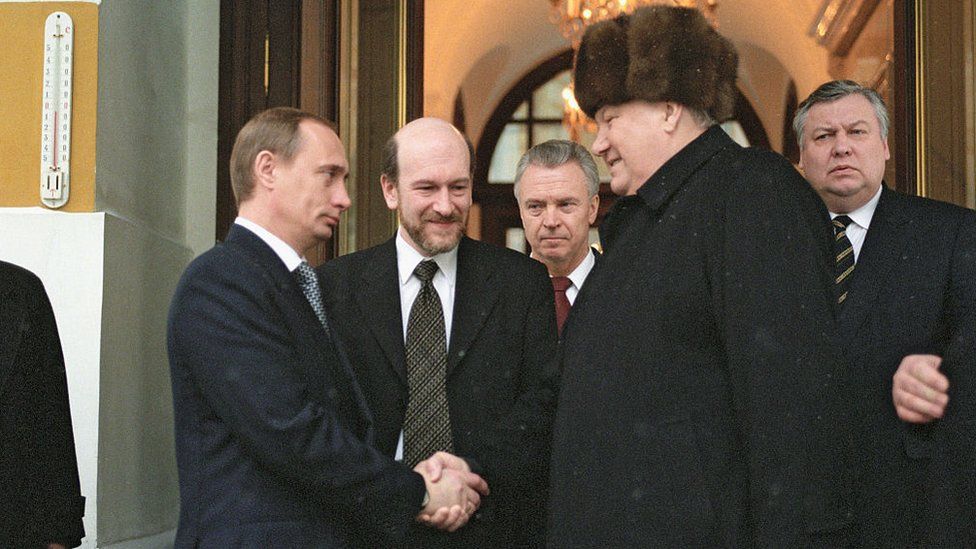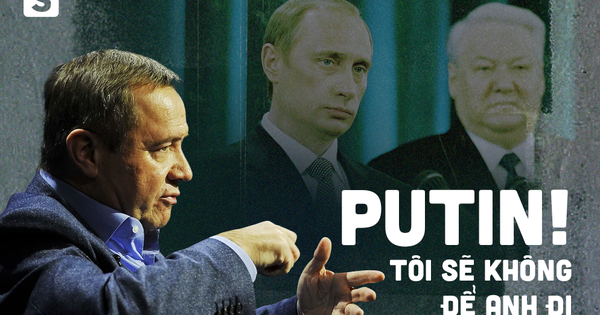A Fateful Meeting with a Special “Path Opener”
“Why Block Putin’s Path?”
In the middle of the day (Moscow time) on December 31, 1999, as the whole of Russia was preparing for a feast, Channel 1 television broadcasted the announcement from President Boris Yeltsin about his early resignation.
“I am stepping down… before my term expires. I realized that I had to do this, that Russia had to enter a new era with new politicians, new faces, wise, powerful and full of vitality… And for those who held power for many years like us, we had to leave”, said President Yeltsin, deciding to transfer power and handing over the nuclear suitcase to Prime Minister Vladimir Putin.
Snowflakes covered the towers and domes of the Kremlin as Yeltsin, wearing a fur hat and a long coat, stepped out at 2 p.m. He shook hands with Putin, got into a Mercedes limousine, and left the building – the place where he had governed Russia for nearly a decade. The lower ranks stood on the threshold to bid farewell.

“I’m going… Take care of Russia!” – these were Yeltsin’s heartfelt words.
The Beginning of Putin’s Power Ladder: Revealing a Fateful Meeting with a Path Opener
According to the memoirs of the first President of Russia, Yeltsin, he had never kept such an important decision secret for so long, not even from his closest aides.
President Yeltsin invited only three people – Prime Minister Vladimir Putin, Chief of Staff Alexander Voloshin, and former Chief of Staff Valentin Yumashev – to his home to inform them of his decision to resign and transfer power to Putin.
On December 28, 1999, as usual, the President’s New Year’s congratulatory speech was recorded for television. The Kremlin hall was decorated with a Christmas tree, a large gold clock, and the presence of a film crew.
Yeltsin started reading the prepared speech, but suddenly stood up and expressed his dissatisfaction: “My voice seems a bit hoarse. And I don’t like this text. We will rewrite it.” The speechwriting team was surprised – everything seemed fine, but he insisted on rewriting it. He suspended the recording until December 31.
In a later memoir, the first president of Russia recalled that he had never kept such an important decision secret for so long, not even from his closest aides.
The specific reason for choosing Putin, according to declassified documents from the library of former US President Bill Clinton about their conversation on September 8, 1999, was revealed when President Yeltsin told Clinton that he had taken a long time to think about who would be the next president of Russia in 2000.
“Unfortunately, at that time, I couldn’t find a suitable candidate. Finally, I met him, Putin; I studied his biography, interests, and acquaintances… I found out that he is a reliable person who is knowledgeable in his field of responsibility. At the same time, he is strong and sociable. He can easily establish good relations and contacts with partners,” Yeltsin said.
Yeltsin emphasized, “I deeply trust that he will be supported as a candidate [in the Russian presidential election] in 2000.”
In another phone conversation with Clinton on November 19, 1999, Yeltsin confirmed that Putin would be his successor. “He is a democrat and understands the West,” Yeltsin said. In response, Clinton, who had already met with Prime Minister Putin at the APEC summit in Auckland, said, “He is very smart.”
Thus, after the announcement at noon on December 31, 2023, Prime Minister Vladimir Putin officially became the Acting President according to the Russian Constitution. The constitution also required early presidential elections to be held within three months.
On March 26, 2000, Putin was officially elected President with 52.94% of the votes.
The Path Opener for Outstanding Deputies
According to Valentin Yumashev, former chief of staff (August 1996-December 1998) of President Yeltsin, Yeltsin resigned a few months before the election to create favorable conditions for his successor. This step allowed Putin to consolidate his position against the “powerful politicians” Yevgeny Primakov and the “talented mayor” Yuri Luzhkov.
Yumashev, who is also Yeltsin’s son-in-law, is believed to have played an important role in opening the door for Putin to enter the political arena.
The first meeting between Yumashev and Putin took place in March 1997.
“At that time, I was the chief of staff of the President, and former Chief of Staff Anatoly Chubais came to see me. He said there was someone very good, powerful, whom he had worked with in St. Petersburg – Vladimir Vladimirovich Putin,” Yumashev recounted.
Chubais said that Putin was the first advisor to Anatoly Sobchak, the former mayor of St. Petersburg, and had taken on great responsibility for years because Sobchak did not really manage all the daily economic activities. Everything fell on Putin’s shoulders.
“And in the first meeting with Putin, I understood: This is a person who has worked with Sobchak, who understands how a giant economy operates, who knows how power operates,” Yumashev said.
As Yeltsin’s chief of staff, Yumashev brought Putin from St. Petersburg to the Kremlin, making him his deputy.
However, about a year later, Putin intended to resign due to work pressure.
“Vladimir Vladimirovich, where are you going? Vladimir Vladimirovich, I won’t let you go,” Yumashev admitted that Putin truly stood out among his deputies, so he did not want to lose this “staff.”
After that, Putin continued to be appointed as the first deputy in the President’s office. All of President Yeltsin’s trips across the country were planned and accompanied by his first deputy – Putin.
Thanks to this, Putin made a strong impression on Yeltsin. He gradually gained trust and was appointed to higher positions such as head of the FSB (Federal Security Service) and later as prime minister. It must be said that before coming to the Kremlin, no one had heard of Putin, except for those who closely followed politics or the residents of St. Petersburg.
Soon after, Putin was considered as Yeltsin’s successor, based on suggestions from Yumashev.
“Yeltsin considered several candidates like Boris Nemtsov, Sergei Stepashin, and Nikolai Aksenenko. He and I discussed finding a successor a lot. I mentioned Putin at some point. Yeltsin asked me what I thought of Putin. I said that I thought he was an excellent candidate and Yeltsin should consider him,” Yumashev said.
“Just three days before the new year, Yeltsin summoned Putin to his home… Yeltsin told Putin that he would not serve until July of the following year, but would resign on December 31.”
Yumashev was also the one who reworked Yeltsin’s resignation speech. On the last day of 1999, President Boris Yeltsin recorded his resignation speech at the Kremlin.
From then until now, it has been two decades since entering the Kremlin, and Putin has held both the positions of President and Prime Minister of Russia.
“Clearly, the Russian people still trust Putin,” emphasized Yumashev, who was also an advisor during President Putin’s time.
Recently, the results of a survey conducted by the Russian Public Opinion Research Institute on March 11, 2024, showed that 80.2% of respondents said they would vote for independent candidate Vladimir Putin in the upcoming Russian presidential election.

